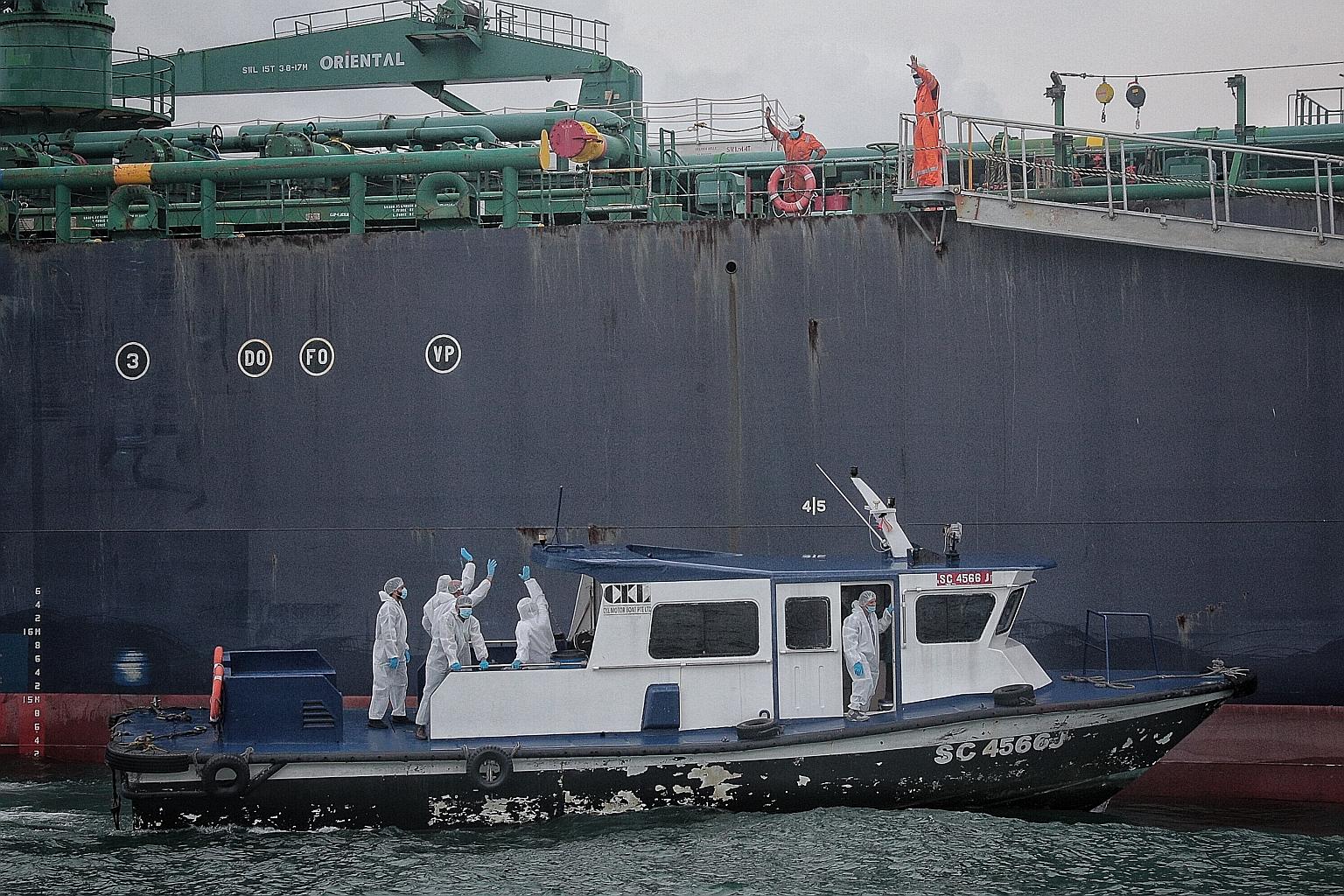Coronavirus: Singapore
Singapore backs global initiative to vaccinate all seafarers
Sign up now: Get ST's newsletters delivered to your inbox

Crew members leaving oil tanker STI Carnaby for Marina South Pier in June last year, after having sailed for months because of border closures. Singapore is one of the first countries to prioritise the safety of seafarers by, for instance, creating "safe corridor" procedures for the changing of a ship's crew.
ST FILE PHOTO
Singapore's maritime sector will work with global stakeholders to vaccinate international seafarers, said Senior Minister of State for Transport Chee Hong Tat yesterday.
The vaccination at Singapore's ports will use a separate pool of vaccines outside the national stockpile, and could include vaccine types not currently under the national programme, he added.
This is in response to the International Maritime Organisation's (IMO) call for sea ports around the world to make vaccinating sea crew members - many of whom are not their citizens - a priority.
The IMO or the shipping industry will have to secure the vaccines for ocean-going seafarers.
Singapore will then vaccinate them according to procedures that are safe and tight, developed here by Singapore's shipping association, port operator, maritime unions, and the Maritime and Port Authority of Singapore.
Speaking at the opening of the International Chamber of Shipping Leadership Insights series, Mr Chee said: "As a global hub port and international maritime centre, Singapore strongly supports this initiative. It is key that we continue to balance public health risks and provide vaccination to the crew."
Vaccinating sea crew strengthens the resilience of global supply lines, including to Singapore, by reducing the rate of infection among shipping crew, who are often cooped up for months in the same vessel.
It also reduces the health risks for Singapore port workers and shore-based personnel who board the vessels.
Singapore is one of the first countries to prioritise the safety of seafarers amid Covid-19 by, for instance, creating "safe corridor" procedures for the changing of a ship's crew.
Since March last year, 145,000 crew changes have been done here, without any infection spreading from crew members to the community. The same "tried-and-tested" processes can be used in creating a vaccination procedure for these crew members, Mr Chee said.
Singapore, as a major maritime hub, has helped to keep global supply chains flowing before and amid Covid-19, he said in his speech.
Port operator PSA has digitalised its ports and platforms to streamline processes of port clearance and vessel maintenance. Following the Suez Canal blockage in March, PSA also successfully cleared in 15 days 45 Singapore-bound container vessels that were badly behind schedule.
In 2019, when India banned the export of some perishable staple goods like onions, PSA found an optimised route to ship these from South-east Europe instead. By doing so, the goods could arrive in 23 days, down from 51 days if the route had not been optimised.
As the shipping industry focuses on the transport of cargo and not the movement of people, it has not been as badly affected as other transport industries like aviation.
Nevertheless, it has experienced vessel delays, congestion at major ports and an increase in freight rates, with many carriers now having to add new containers and ships to meet the increased demand for sea transport.
On the switch to new, carbon-neutral fuels such as ammonia and hydrogen to reduce the industry's footprint, Mr Chee said Singapore supports the introduction of a global carbon tax in the medium-to longer-term.
It also backs the setting up of an International Maritime Research and Development Board and an IMO Maritime Research Fund, which will mandate a US$2 (S$2.70) contribution by parties for every tonne of fossil fuel used, he said.


